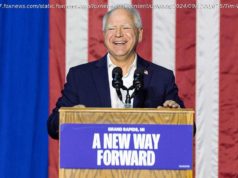Here’s what you need to know to start your day.
(Want to get this briefing by email? Here’s the sign-up .)
Good morning.
President Trump pulls out of the Iran deal, Ireland tests Facebook and Armenia changes leadership. Here’s the latest:
• President Trump declared he was withdrawing the U. S. from the Iran nuclear accord, calling it a “horrible one-sided deal” that didn’t bring peace and never would. But America’s European allies have committed to staying in the deal, raising fears of a diplomatic and economic clash as the U. S. reimposes stringent sanctions on Iran.
The sanctions would require European countries to reduce their oil imports from Iran, while European companies would have to close their operations there or incur penalties from the American banking system. ( Here’s how the world reacted to the announcement.)
Our national security correspondent sees Mr. Trump’s decision as a grand, highly risky bet that he can “break the regime.”
_____
• The May 25 referendum on Ireland’s abortion ban has spurred Facebook to introduce tools aimed at preventing foreign meddling in the vote, like blocking political advertising from foreign groups and letting users flag questionable ads.
The social media giant hopes to use those strategies in future elections. But the big question is whether they will work.
Transparency activists have already seen a surge in online ads from questionable sources, raising concerns that foreigners are trying to influence the debate. Researchers traced ads targeting undecided voters to conservative Roman Catholic groups in the U. S.
Separately, U. S. senators identified around 20 states where Russian hackers probed election systems in 2016, but found no evidence that vote tallies were changed.
_____
• Meet Nikol Pashinyan, a protest leader who just became Armenia’s interim prime minister .
The former newspaper editor and political prisoner galvanized a civil disobedience movement that transformed the country’s political landscape in just three weeks, forcing aside the longtime president, Serzh Sargsyan.
Meanwhile, Hungary’s far-right prime minister, Viktor Orban, was formally sworn in for a third term. Here’s a closer look at the ways he’s reshaped the country so far. Now Mr. Orban has the power to make constitutional changes many fear will further transform Hungary into an autocratic state.
_____
• Big in Europe: feathered headdress, tomahawk chops and Native American mascots.
American sports teams have long faced criticism for using indigenous names and symbols in their branding. But the practice is popular among European teams and fans, who have their own ideas about what’s socially acceptable (like Buffalo Ben, above, the official team mascot for the Belgian soccer team K. A. Gent).
Now, however, pressure to confront those stereotypes is growing, and so is their resistance to change.
“There’s a learning curve for people in Europe, but it needs to be done,” said a Native American woman living in England.
_____
• Christie’s New York begins a three-day auction of a Rockefeller family art collection that could be the largest single-owner sale, and the largest charitable one, in history. Above, one of five Monets on offer.
• Digital currencies and artificial intelligence are turning a once-obscure computer chip into a coveted but scarce commodity.
• Facebook reorganized into three new divisions and shuffled the leadership of its key businesses in one of its biggest corporate shifts.
• The Walt Disney Company reported its strongest quarterly results in two years, but the performance was shadowed by uncertainty over its pending deal to buy most of 21st Century Fox.
• Here’s a snapshot of global markets .
• A shell company that President Trump’s lawyer Michael Cohen, above, used to pay hush money to a pornographic film actress received payments from a firm linked to a Russian oligarch. [ The New York Times]
• In Germany, three baby girls have been found abandoned, a year apart, in and around Berlin. DNA tests show all three had the same parents. [ The New York Times]
• Britain’s upper house of Parliament voted in favor of staying in the E. U.’s single market after Brexit, challenging the government of Prime Minister Theresa May. [ BBC]
• Italy’s deal with Libya to stop migrants reaching Europe is facing a legal challenge over allegations that it subjects migrants to grave human rights violations, including torture and slavery. [ The Guardian]
• A former C. I. A. officer suspected of helping China dismantle the agency’s spy network in that country was charged with conspiring to commit espionage. [ The New York Times]
Tips, both new and old, for a more fulfilling life.
• Recipe of the day: Broccoli comes to life with orange and sesame.
• Organize your home to create a more relaxed and efficient life.
• You need a good, 10-foot charging cable for your phone .
• The Baltimore Symphony Orchestra’s after-school music program has become a refuge for children, above, in a city plagued by poverty and gun violence. Some students have gone on to play with famous musicians, including the cellist Yo-Yo Ma and the trumpeter Wynton Marsalis.
• In memoriam: Ermanno Olmi, 86, an Italian film director who chronicled his country’s 20th-century evolution from a backward agrarian economy into an industrial giant.
• And in one of our most-read stories today, our Op-Ed columnist Bari Weiss looks at the Intellectual Dark Web, an alliance of iconoclastic thinkers, academic renegades and media personalities that is making an end run around the mainstream conversation, and drawing attention around the world. “People are starved for controversial opinions,” one member said.
Peter Pan helps sick children. Not fictionally, financially.
The author J. M. Barrie, above, who was born on this day in 1860, donated the rights to his most famous creation to the Great Ormond Street children’s hospital in London in 1929. In a front-page report at the time, The New York Times estimated their worth at “roughly $10,000 a year,” which it said was equivalent to a sixth of the hospital’s income.
It would have been clear that the gift was of lasting value: The boy who never grows up was introduced in 1902, becoming the subject of a hit play two years later, and then a novel. He had already inspired a statue in a London park, and even begun his long career in movies.






